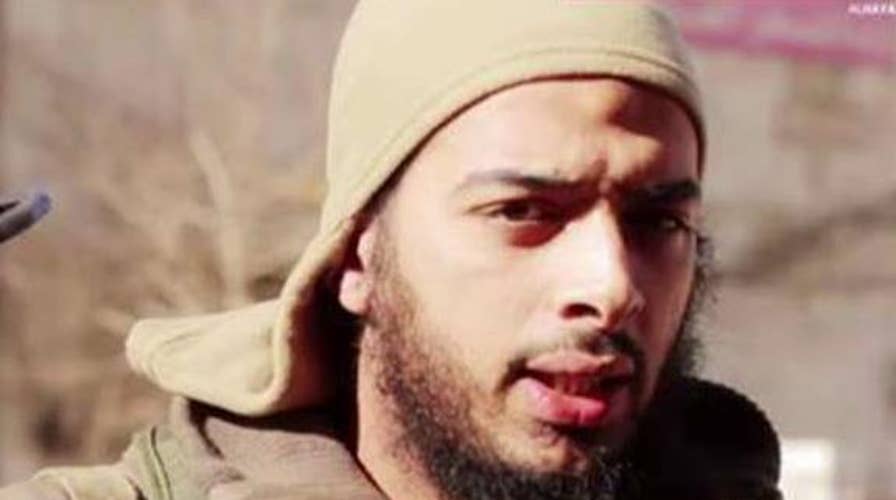Suspected ISIS recruiter being tried 'in absentia' in Paris
Trial of alleged recruiter and six others begins in Paris
German lawmakers on Friday overwhelmingly approved a broad noncombat mission to aid the fight against Islamic State militants, sending reconnaissance jets and a frigate following France's call for help after last month's deadly attacks in Paris.
At the same time, a French journalist held hostage by ISIS described the intensification of airstrikes in Syria as a "trap." Nicolas Henin, who was held captive for 10 months, said the strikes risked pushing people into the hands of the Islamist extremists.
In an interview with The Associated Press, Henin said the bombings risk pushing the Syrian people straight into the arms of Islamic State militants, who he says position themselves as the only group able to protect them.
Henin says "it's counterproductive to increase the strikes. We cannot go forward. We cannot also stop them, go backward. This is the definition of a trap."
The German parliament voted 445 in support of the new mission and 146 against with seven abstentions. ISIS militants claimed responsibility for the Nov. 13 attacks in Paris that killed 130 people and wounded hundreds.
The $145 million German mission will see two Tornado reconnaissance planes sent to Turkey's Incirlik base as early as next week. The frigate is already en route to join French aircraft carrier Charles de Gaulle, which President Francois Hollande visited Friday in the eastern Mediterranean.
"The goal... is to fight and contain IS, and destroy their safe havens and their ability to lead worldwide terror operations," Defense Minister Ursula von der Leyen told reporters Thursday before heading to Ankara for talks with her Turkish counterpart.
She also met with Turkish President Recep Tayyip Erdogan to talk about stationing German troops there and other aspects of the deployment, the Defense Ministry said Friday.
In all, Germany plans to send up to six Tornado reconnaissance planes and a tanker aircraft, as well as the frigate to help protect the French aircraft carrier but won't actively engage in combat.
A maximum contingent of 1,200 soldiers was also approved, serving as support troops in Turkey and elsewhere, including at headquarters operations in Qatar and Kuwait. The German mission is open-ended, but needs annual Parliamentary approval.
"There's nothing in this mandate about the deployment of ground troops," Chancellor Angela Merkel's spokesman Steffen Seibert said Friday. "It's not planned."
Germany's opposition Left Party lobbied against the mission, with lawmaker Sahra Wagenknecht telling Parliament "bombing brings no peace."
Hollande visited the Charles de Gaulle, France's only aircraft carrier, which was dispatched to the region a week before the Nov. 13 attacks. The French aircraft carrier has been launching raids against Islamic State bases as part of the U.S.-led coalition's strikes against the group -- 110 sorties so far. It carries 2,000 people on board.
British jets flew their first missions as part of the coalition's anti-ISIS efforts on Thursday, striking oil fields in eastern Syria that help finance ISIS.
On the diplomatic front, Saudi Arabia next week will host Syrian opposition groups and many of the main rebel factions seeking to oust Syrian President Bashar Assad. Saudi Arabia is a main backer of the opposition groups and the three-day meeting is the first it has hosted since the outbreak of the nearly five-year war.
Many of the groups had rejected any negotiations with Damascus as long as Assad was in power. Now they will attempt to join a process that the United States and its allies say must eventually lead to Assad's removal.
A peace plan agreed to last month in Vienna by 17 nations sets a Jan. 1 deadline for the start of negotiations between Assad's government and opposition groups. The plan says nothing about Assad's future, but states a "free and fair election" would be held within 18 months.
Among the nations that took part in the Vienna meeting were the United States, Russia, Iran, Saudi Arabia, Qatar and Turkey. Russia and Iran have been Assad's strongest supporters since the crisis began in March 2011, while Saudi Arabia and Turkey have backed factions trying to remove the Syrian president from power.
Iran has denounced the meeting, saying it will add new obstacles instead of helping to stop the fighting.
The Associated Press contributed to this report.

